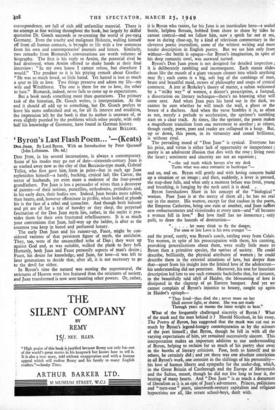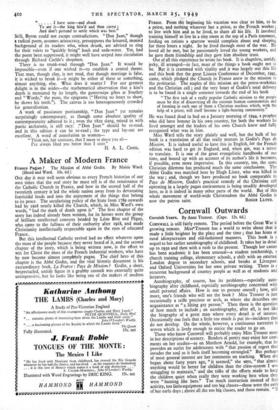Byron's Last Flash Poem... (Keats)
Dion Juan. By Lord Byron. With an Introduction by Peter Quennell (John Lehmann. 10s. tid.)
DON JUAN, in his several incarnations, is always a contemporary. Some of his modes may go out of date—sixteenth-century Juan is as washed away now as the clay of that Boccacio-type monk, Gabriel Tellez, who first gave him, form in print—but in each age Juan replenishes himself—a hardy, bucking, cynical lad; like Caesar, the terror of husbands, yet even more a molester of the four-posted grandfathers. For Juan is less a persuader of wives than a destroyer of parents—of their notions, punctilios, orthodoxies, prejudices and, in his early days, their bodies too. Indeed, Juan breaks more tablets. than hearts,.and, however effeminate in profile, when looked at plumb his is the face of a rebel and iconoclast. And though both balcony and pit are all for a tale of bawdry or they sleep, the perpetual fascination of the Don Juan myth lies, rather, in the outlet it pro- vides them for their own frustrated rebelliousness. It is as much your conventions that Juan, half-way up the ladder, is after as the countess you keep in bored and perfumed luxury.
The early Don Juan and his runner-up, Faust, might be con- sidered variants of that persistent figure of myth, the antichrist. They, too, were of the unsanctified tribe of Dan • they were up against God and, as was suitable, walked the plank to fiery hell. Humanly, both Juan and Faust personify aspects of man's desire ; Faust, his desire for knowledge, and Juan, for love—it was left to later generations to decide that, after all, it is not necessary to go to the devil for either.
In Byron's time the natural was ousting the supernatural, the strictures of Heaven were less featured than the strictures of society, and Juan transformed is now seen taunting other powers. Or, rather, it is Byron who taunts, for his Juan is an inarticulate hero—a sealed bottle, helpless flotsam, bobbed from shore to shore by tides he cannot control—and we follow him, now a speck far out at sea, now in daring close-up, by a kind of television commentary in the cleverest poetic journalism, some of the wittiest writing and most tender description in English poetry. But we see him only from without—the bottle is opaque—for Byron's imagination, in spite of his deep romantic cowl, was outward turned.
Byron's Don Juan poem is not designed for detailed inspection ; it is deliberately rambling and inconsequent. Each stanza slides about like the mouth of a giant vacuum cleaner into which anything may fly ; each canto is a big, soft bag of the combings of man, brute and beautiful maid, straws of philosophy and snaps of cynical comment. A jeer at Berkeley's theory of matter, a sultan welcomed by a " milky way " of women, a doctor's prescription, a footpad, a dissertation on literary technique—there's no knowing what will come next. And when Juan puts his hand out in the dark, we cannot be sure whether he will touch the wall, a ghost or the breast of a duchess. And when the verse fumbles it is, as often as not, merely a prelude to acceleration, the sprinter's tumbling start on a clear track. At times, like the sprinter, the poem makes a magnificent transition from one movement to another ; at others, though rarely, poem, poet and reader are collapsed in a heap. But, up or down, this poem, in its virtuosity and casual brilliance, is without rival.
The prevailing mood of "Don Juan" is cynical. Everyone has his price, and virtue is either lack of opportunity or inexperience ; purity is an adolescent illusion that dies with the rose ; living rusts the heart ; sentiment and sincerity are not an equation ; " —the sad truth which hovers o'er my desk Turns what was once romantic to burlesque "- and on, and on. Byron will gently and with loving concern build up a situation or an image ; and then, suddenly, a lever is pressed, the trap-door falls, and what only a moment before was fresh, young and breathing, is hanging by the neck until it is dead.
Byron foreshadows Shaw in his concept of the " biological " woman. Poor Juan is at the mercy of them all • he has no real say in the matter. His women, except for that cuckoo in the poem, the Empress Catherine, bring one ruin or another, and Juan suffers new embarrassments and vicissitudes at every turn—and " all because a woman fell in love." But love itself has no innocence ; only guilt, to draw the hounds of destruction- . let none think to fly the danger, For soon or late Love is his own avenger "- and the proof, surely, was Byron's coach, rattling away from Calais. Yet women, in spite of his preoccupation with them, his cunning, provoking generalisations about them, were really little more to Byron than a primitive species, the natives of society. He could describe, brilliantly, the physical attributes of women • he could describe them in the external situations of love, but deeper than that—apart from his insight into the limited love of the adolescent— his understanding did not penetrate. Moreover, his zest for luxuriant description led him to use such romantic backcloths that, for instance, in the beautifully told idyll of Haidee, the blossoming of love is dissipated in the claptrap of an Eastern banquet. And yet we cannot complain of Byron's injustice to beauty, caught up again in Haidee's epitaph-
" Thus lived—thus died she ; never more on her
Shall sorrow light, or shame. She was not made Through years or moons the inner weight to bear."
What of the frequently challenged sincerity of Byron ? What of the mask and the man behind it ? Harold Nicolson, in his essay, The Poetry of Byron, has suggested that the mask was cut out as much by Byron's legend-hungry contemporaries as by the scissors of the poet himself ; that Byron, though he fell in with all the varying expectations of him, yet remained successively sincere. This interpretation makes an important addition to our understanding of Byron, helping to reclaim for us much of his poetry shot away in the booths of literary criticism. Pose, both to himself and to others, he certainly did ; and yet there was one absolute conviction in all Byron's work, one constant in the shiftings of his personality— his love of human liberty and sympathy for the under-dog, which, in the Great Britain of Castlereagh and the Europe of Metternich and the Sultan, meant, though he did not live long to hear it, the beating of many hearts. And " Don Juan " is as much a document of liberalism as it is an epic of Juan's adventures. Princes, politicians and " turn-coat " poets, nineteenth-century capitalism and religious hypocrisies are all, like errant school-boys, dealt with.
I have seen—and shook To see it—the king hiss'd and then carest ; And don't pretend to settle which was best."
Still, Byron could not escape contradictions. "Don Juan," though a radical poem, assumes aristocracy, presupposes the leisured, monied background of its readers who, when drunk, are advised to ring for their valets to "quickly bring" hock and soda-water. Yet, had the poem been suppressed, it might well have seeped into circulation through Richard Carlile's shopmen.
There is no trunk-road through "Don Juan." It would be impossible—even if one wished it—to establish a central, theme. That man, though clay, is not mud, that though marriage is false, it is wicked to break it—it might be either of these or something, almost anything, else. What does it matter ? For our greatest delight is in the asides—the mathematical observation that a kiss's depth is measured by its length, the guttersnipe gibes at Southey and " Wordy," the puns, the epigrams (" Having no heart to show, he shows his teeth."). The canvas is too heterogeneously crowded for generalisation.
A work of passionate partisanship, " Don Juan " yet remains surprisingly contemporary, as though some absolute quality of contemporaneity adhered to it ; even the 182o slang, mixed in with poetic archaisms, is still racy: ." Don Juan " should be re-read, and in this edition it can be re-read ; the type and lay-out are excellent. A word of consolation to women-
" Think not, fair creatures, that I mean to abuse you all— I've always liked you better than I state."
H. A. L. CRAIG.















































 Previous page
Previous page